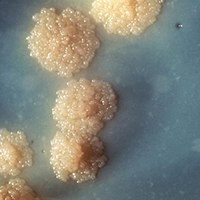Effectiveness and cardiovascular safety of delamanid-containing regimens in adults with multidrug-resistant or extensively drug-resistant tuberculosis: A nationwide cohort study from Belarus, 2016-18

Published: January 14, 2021
Abstract Views: 1623
PDF: 931
Supplementary: 146
Supplementary: 146
Publisher's note
All claims expressed in this article are solely those of the authors and do not necessarily represent those of their affiliated organizations, or those of the publisher, the editors and the reviewers. Any product that may be evaluated in this article or claim that may be made by its manufacturer is not guaranteed or endorsed by the publisher.
All claims expressed in this article are solely those of the authors and do not necessarily represent those of their affiliated organizations, or those of the publisher, the editors and the reviewers. Any product that may be evaluated in this article or claim that may be made by its manufacturer is not guaranteed or endorsed by the publisher.
Similar Articles
- Rupak Singla, Amitesh Gupta, Vikas Kumar, Chandrasekaran Padmapriyadarsini, Devika Tayal, Shweta Anand, Abhishek Faye, AK Hemanth Kumar, Madhumita Paul Choudhary, Study of risk factors and clinical management of patients with clinical non-response due to low plasma levels of anti-tubercular drugs , Monaldi Archives for Chest Disease: Early Access
- S.M. Mirsaeidi, P. Tabarsi, M.O. Edrissian, M. Amiri, P. Farnia, S.D. Mansouri, M.R. Masjedi, A.A. Velayati, Primary multi-drug resistant tuberculosis presented as lymphadenitis in a patient without HIV infection , Monaldi Archives for Chest Disease: Vol. 61 No. 4 (2004): Pulmonary series
- S.M. Mirsaeidi, P. Tabarsi, A. Mardanloo, G. Ebrahimi, M. Amiri, P. Farnia, M. Sheikhleslami, V. Bakayev, F. Mohammadi, S.D. Mansouri, M.R. Masjedi, A.A. Velayati, Pulmonary Mycobacterium Simiae infection and HTLV1 infection: an incidental co-infection or a predisposing factor? , Monaldi Archives for Chest Disease: Vol. 65 No. 2 (2006): Pulmonary series
- Alessandra Schiavo, Francesca M. Stagnaro, Andrea Salzano, Alberto M. Marra, Emanuele Bobbio, Pietro Valente, Simona Grassi, Martina Miniero, Michele Arcopinto, Margherita Matarazzo, Raffaele Napoli, Antonio Cittadini, Pregabalin-induced first degree atrioventricular block in a young patient treated for pain from extrapulmonary tuberculosis , Monaldi Archives for Chest Disease: Vol. 87 No. 3 (2017)
- Varvara Solodovnikova, Ajay M.V. Kumar, Hennadz Hurevich, Yuliia Sereda, Vera Auchynka, Dzmitry Katovich, Dzmitry Klimuk, Aliaksandr Skrahin, Svetlana Setkina, Iryna Charnysh, Askar Yedilbayev, Alena Skrahina, Effectiveness and safety of delamanid- or bedaquiline-containing regimens among children and adolescents with multidrug resistant or extensively drug resistant tuberculosis: A nationwide study from Belarus, 2015-19 , Monaldi Archives for Chest Disease: Vol. 91 No. 1 (2021)
- Teona Avaliani, Yuliia Sereda, Hayk Davtyan, Nestani Tukvadze, Tamar Togonidze, Nana Kiria, Olga Denisiuk, Ogtay Gozalov, Sevim Ahmedov, Arax Hovhannesyan, Effectiveness and safety of fully oral modified shorter treatment regimen for multidrug-resistant tuberculosis in Georgia, 2019-2020 , Monaldi Archives for Chest Disease: Vol. 91 No. 1 (2021)
- R. Luzzati, M. Confalonieri, A. Cazzadori, P. Della Loggia, R. Cifaldi, C. Fabris, M. Biolo, M. Borelli, C. Longo, E. Concia, Prolonged hospitalisation for immigrants and high risk patients with positive smear pulmonary tuberculosis , Monaldi Archives for Chest Disease: Vol. 75 No. 2 (2011): Pulmonary series
- Seyed Hamid Borsi, Homeira Rashidi, Maryam Shaabanpour, Hanieh Raji, The effects of inhaled corticosteroid on insulin sensitivity in asthmatic patients , Monaldi Archives for Chest Disease: Vol. 88 No. 1 (2018)
- Mariana Buziashvili, Hayk Davtyan, Yuliia Sereda, Olga Denisiuk, Ogtay Gozalov, Nino Lomtadze, Arax Hovhannesyan, Incidence rate and time to serious adverse events among rifampicin resistant tuberculosis patients in Georgia treated with new and repurposed anti-tuberculosis drugs, 2016-2018 , Monaldi Archives for Chest Disease: Vol. 91 No. 1 (2021)
- Kiran B, Rupak Singla, Neeta Singla, Vinay V, Kuljeet Singh, Madhumita Paul Choudhury, Nilotpal Bhattacherjee, Factors affecting the treatment outcome of injection based shorter MDR-TB regimen at a referral centre in India , Monaldi Archives for Chest Disease: Vol. 93 No. 3 (2023)
You may also start an advanced similarity search for this article.

 https://doi.org/10.4081/monaldi.2021.1647
https://doi.org/10.4081/monaldi.2021.1647




